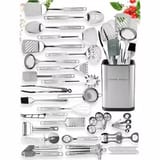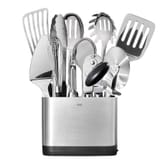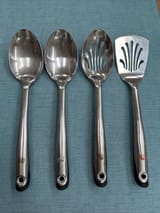>>2932201>I don't know anything about literally anything.A spoon, used to pick at frozen ice cream, has more than 10 pounds of force exerted into it. Spoons used to pry open crab legs and lobster shells have more than 3 pounds of force exerted on them. Stirring spoons have generally between 1-3 pounds exerted on the thinnest point of the spoon, even under home cooking situations. If you're stirring a pot of stew, the viscosity of that liquid will prevent you from stirring it like water, increasing the total shear force on both the liquid, and the spoon.
>10 gallons of soup I lost thanks.
>Hand whisks are always flimsy because people use an electric whisk for big volumes.Dude holy fucking shit. Ask your mom if you can cook with her sometimes so you have a reference point for your opinions.
I've NEVER had a flimsy hand whisk. It's the only thing that is so simple, and yet shaped such that it cannot be made of one part, that it's entirely possible to just look at it through the packaging and know if it will be any good. I have some that are JUST wire, carefully wrapped into the shape of a hand whisk. Works great! I have Danish dough whips, or whisks, they are somewhat whisk, somewhat dough-folding tool. Works fantastic, long wooden handle can be used as a rolling pin. Neither of these are flimsy, because whisks are generally not flimsy. You can't just press a whisk out of a piece of sheet steel like you can a spoon, fork, or knife. You have to intentionally design it to be flimsy, plastic parts, hollow handles, etc.
If you don't notice those things picking something up, you lack experience.
For that matter, spoons are the least important part of what OP's problem is. EVERY utensil that can be pressed from a sheet, is. Spatula, which regularly lifts .24-2 lbs, and is pressed into and scraped against surfaces with more than 4 lbs, is also sheet steel, and bends freely. Tongs, their tips will bend.



![xkvux52eelm4my4mxxra_epec9c37b1rrs2gf[1]](/thumb/diy/1752816147642860.jpg)

